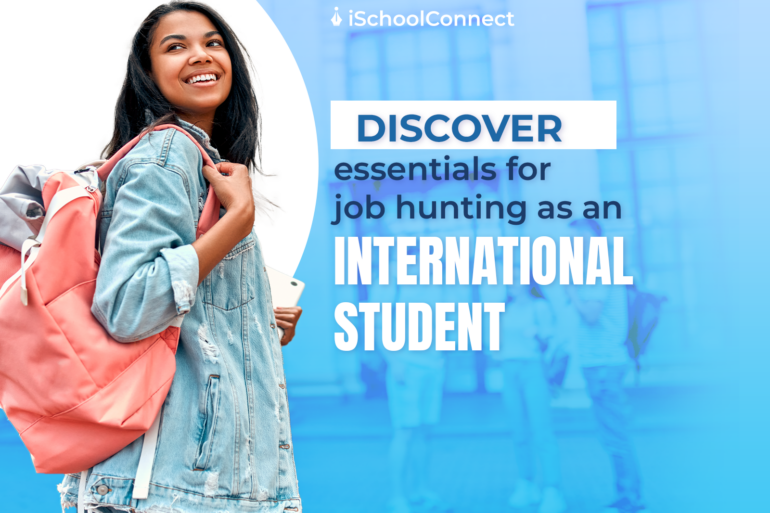Table of Contents
- Navigating the international job hunt
- Job search strategies for international students
- Understand your visa status
- Build a strong resume
- Network strategically
- Research employers and industries
- Develop interview skills
- Utilize job search resources
- Work on your English language skills
- Understand the cultural differences
- Prepare for job search challenges
- Understand work authorization requirements
- Key takeaways
- FAQs
Navigating the international job hunt
Looking for a job is a challenging endeavor for anyone, but for international students, it often comes with additional hurdles and complexities. As an international student, you bring a unique set of skills and experiences to the job market. However, you also have to face visa restrictions, cultural differences, and unfamiliar job search processes. In this blog, we will explore the essential steps and job search strategies that can help international students successfully navigate the job-hunting process in a different country.
Job search strategies for international students
Applying certain job search strategies is essential for securing employment in a foreign country. These students often face challenges such as tax compliance, language barriers, and a competitive job market. To overcome these hurdles, international students should refer to the following-
Understand your visa status
Before embarking on your job search journey, it is crucial to understand your visa status and the associated work restrictions. Most international students in the United States are typically on an F-1 visa, which allows for limited employment opportunities. While you can work on-campus, there are strict regulations governing off-campus employment, including Optional Practical Training (OPT) and Curricular Practical Training (CPT). It is essential to know the specifics of your visa and work within its constraints to avoid any legal issues.
Build a strong resume

Your first opportunity to make a positive impression on potential employers is a well-crafted resume. Tailor your resume to highlight your relevant skills, experiences, and achievements. Emphasize any internships, volunteer work, or part-time jobs you’ve held, as they can demonstrate your adaptability and work ethic. Use a formal and professional format and consider seeking assistance from your university’s career services office to create a compelling resume.
Network strategically
The fundamental part of the job-hunting process is networking, especially for international students. Attend networking events, career fairs, and industry conferences to connect with professionals in your field. Join student organizations related to your area of interest and engage in online networking platforms such as LinkedIn. Building a strong professional network can open doors to job opportunities and provide valuable insights into the job market.
Research employers and industries
Thoroughly researching potential employers and industries is essential to target your job search effectively. Identify companies that sponsor international employees or have a diverse workforce. Explore industries that align with your career goals and qualifications. Understanding the job market and the demand for your skills will help you make informed decisions about where to focus your job search efforts.
Develop interview skills

An interview is a critical step in the job-hunting process, and it can be especially challenging for international students due to language barriers and cultural differences. Practice answering common interview questions and develop concise, clear responses. Consider enrolling in interview preparation workshops offered by your university’s career services or seeking guidance from mentors. Effective communication during interviews is crucial to leave a positive impression on potential employers.
Utilize job search resources
Take advantage of the job search resources available to you. Your university’s career services office can provide guidance, job listings, and interview opportunities. Online job boards, industry-specific websites, and professional associations can be valuable sources of job postings. Don’t limit your search to one platform. Try to increase your chances of finding suitable job positions.
Work on your English language skills
Fluency in English is often a prerequisite for many job opportunities, especially in English-speaking countries. If English is not your first language, consider enrolling in language courses or seeking language improvement programs. Strong language skills will not only help you during interviews but also in your day-to-day communication in the workplace.
Understand the cultural differences
There is a significant role of cultural differences in the job-hunting process. Understand the cultural norms in your host country, including interview etiquette, workplace behavior, and communication styles. It’s essential to adapt and demonstrate cultural sensitivity to succeed in a diverse work environment. Seek advice from international mentors or cultural orientation programs offered by your university.
Prepare for job search challenges
Job hunting can be a lengthy and sometimes frustrating process. Be prepared to face rejection and setbacks along the way. Maintain a positive attitude, stay persistent, and continue refining your job search strategy. You can also seek support from friends, family, or career counselors to stay motivated throughout your job search journey.
Understand work authorization requirements
If you secure a job offer, make sure you understand the work authorization requirements and processes for your specific visa category. You might have to apply for documents such as an Employment Authorization Document (EAD) in the United States for work authorization. Compliance with immigration regulations is crucial for maintaining your legal status while working as an international student.
Read more: How to Engage Prospective Families of Higher-ed Students
Key takeaways
- Know the specifics of your visa and the associated work restrictions to avoid legal issues during your job search.
- Thoroughly research potential employers and industries to target your job search effectively and identify companies that sponsor international employees.
- Practice answering common interview questions, seek interview preparation workshops, and focus on effective communication during interviews.
- Be persistent, maintain a positive attitude, and seek support to overcome setbacks and challenges in your job search.
We hope you found this information valuable. If you have any questions or need further assistance regarding studying abroad, don’t hesitate to reach out to us. Click here to contact our team for personalized guidance and support on your journey to a successful career abroad.
Liked this blog? Read next: An essential guide to scholarships for Aoyama Gakuin University
FAQs
Q1. What is the fastest way to find a job abroad?
Ans- The fastest way to find a job abroad is often through networking, using international job boards, and targeting multinational companies that hire internationally. Considering temporary positions or teaching English abroad can provide quicker entry into the job market in your desired destination.
Q2. What should I do if I want to switch careers or industries as an international student?
Ans- Consider acquiring additional skills or certifications related to your new field of interest. Networking and informational interviews can also help you make a transition.
Q3. How can I overcome the ‘lack of local experience’ challenge when job hunting abroad?
Ans- Emphasize transferable skills and global experiences that demonstrate your ability to adapt and contribute to the new work environment. In this way, you might be able to overcome the lack of local experience while looking for a job abroad.






